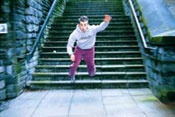At Sgript Cymru |
| Sgript Cymru- Ghost City , Chapter Arts Centre Cardiff , March 11, 2004 |
 It’s a sign of maturity, I guess, when a city becomes not just the backdrop to drama but the subject itself – and recently while Cardiff may have missed out on the City of Culture bid it does seem to be getting some status on the stage.
It’s a sign of maturity, I guess, when a city becomes not just the backdrop to drama but the subject itself – and recently while Cardiff may have missed out on the City of Culture bid it does seem to be getting some status on the stage.There are precedents: before he became really famous, Rhodri Morgan penned a little book called Half and Half a Capital and ex-reporter and successful novelist John Williams has famously explored Cardiff’s underbelly. Playwright Ed Thomas wrote Song for a Forgotten City, a kind of lament for Cardiff’s failings, but is currently revising his thoughts in a seven-year collaboration with Mike Pearson and Mike Brookes that yielded a couple of weeks ago Who Are You Looking At ? And now Gary Owen, resident of Splott, has created a remarkable piece of theatre set over 24 hours in 25 different locations round the city, starting at a local radio station on Llantrisant Road and ending up in Mary Ann Street. Owen is one of that new breed of postmodernist playwright who freely admits to having no background in theatre – or, indeed, any previous record until he came out with the amazing Crazy Gary’s Mobile Disco a couple of years ago. That, like Ghost City, was a far from conventional piece of theatre since it was essentially three monologues that only gradually revealed themselves to be linked, but the freshness of the writing knocked many of us out. Those who criticised that earlier piece because it wasn’t “real theatre” will be even more flummoxed by Ghost City, with its seemingly unrelated snapshots of contemporary Cardiff life – but they miss the point. Fed a monotonous diet of naturalistic drama by the major companies and on tv, they think theatre has to have a storyline, developed characters, conflict, catharsis, and Ghost City is one of a whole tranche of theatre today that doesn’t conform to that model. Instead it suggests life just ain’t like that: and a city like Cardiff, the hero/heroine of this play, can best be portrayed as a series of fragmented moments with no apparent coherent meaning: the train buffet trolleyman trying to make the most of a mundane job, the two drug-dealing kids ripping off a would-be cool customer, the pathos of a father whose incipient dementia prevents him from knowing his own son, the sub-editor on the Western Mail who is incensed by a reader’s right-wing letter (and our own arts editor even gets a name-check !)… all twenty-five of these scenes, many to do with parents and children. So Ghost City is not your usual theatrical fare if you’re used to the New Theatre or Eastenders – but if you prefer Ed Thomas and Eddie Ladd, say, not to mention an honourable lineage from Jean Genet and Edward Bond to Martin Crimp and David Greig, then you’ll have no problems with the fact Ghost City has no plot, with characters that in general have no name, is written in a kind of blank verse, and shows an utter disregard for an audience’s need to find meaning or pursue through-lines. We meet around thirty-four different characters in the play (most of the scenes are monologues), played by four excellent performers (Jonathan Floyd, Nia Gwynne, Rachel Isaac and Celyn Jones), but as we make our journey along the twenty-five stations of the cross, as it were, there is no route to enlightenment for the pilgrims save, perhaps, the recurrent anguish over the relationship between kids and their mothers and fathers. I am not convinced every scene is as good as it could be and I find the end problematic (at least in this production) but this is an organic epic that could evolve more. I admit it took me a while properly to appreciate the strengths and depths of Crazy Gary’s Mobile Disco, where initially the radical form seemed more arresting than the content, so I am not too perturbed by the fact that as yet I have not totally got my head round Ghost City and director Simon Harris’s realisation of the script. What I am sure of is that Gary Owen is a significant new Welsh writer (and he is specifically Welsh in the same way that, for example, Peter Gill, Gareth Miles, Alan Osborne, Meic Povey, Ian Rowlands and Ed Thomas are) with an original vision and, underlying that sharp writing and acute observation, a real concern for just where we are going as a society in the twenty-first century. |
Reviewed by: David Adams |
This review has been read 2676 times There are 70 other reviews of productions with this title in our database:
|
